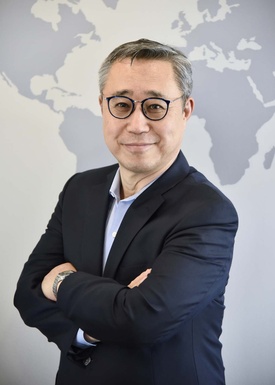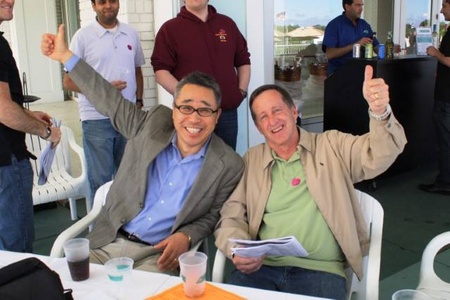Pushed by his father to study in the US
I got to know Hikaru Fujimoto, a CPA based in Chicago, when I interviewed him about advice on bank accounts and other accounting matters for returnees. Fujimoto's explanations were concise and clear, and I intuitively felt that there must be many Japanese people living in the United States who would like to seek advice from an accountant like him. I approached him with the motivation of wanting to interview Fujimoto himself, who is now a U.S. citizen, rather than advice from an accountant, and the online interview was realized.
Fujimoto's answer to my first question, "What were you doing before you came to America?" was unexpected.
"There is a Tokyu Hotel affiliated hotel in the Republic of Vanuatu in the South Pacific, and I worked as the restaurant manager there. I worked at the hotel in Vanuatu for about two years after graduating from university. While working there, I decided I wanted to study more about hotels in the United States, so I applied for a leave of absence from my company and returned to Japan for a short vacation before going to the United States. It was during this time that I was diagnosed with cancer and underwent two emergency surgeries. I came to study at Michigan State University Graduate School six months later."
When asked, "After being diagnosed with cancer and then having surgery, wouldn't it be normal to want to give up on going abroad and stay in Japan?" Fujimoto replied, "After the surgery, I had checkups once a month to make sure the cancer hadn't spread. At that time, I was feeling negative and was about to give up on going abroad alone. But my father opposed my decision to cancel, saying, 'You have to go right away.' So, with my father giving me a big push, I went to the United States."
"Until then, I was just an older brother who had worked in society for two or three years, but with my father's encouragement and by going to the United States, my way of thinking changed drastically. I had thought that something like that would never happen to me, but after experiencing that humans can die so easily, I started to think more positively: if there's something I want to do, I should do it, I should live life with a positive attitude and optimism, and I should achieve my goals." His personality changed drastically after he got seriously ill.
After his surgery, Fujimoto made the big decision to study abroad at graduate school, where he experienced his next turning point. "I came in first in my hotel accounting class. That's when I realized I was good with numbers, and I thought I wanted to become an accountant in America if I could. So I changed my major to finance, apologized to the Japanese company I was on leave from, asked my parents for a loan for my tuition, and completed my MBA." After completing his studies, Fujimoto never returned to Japan, but instead worked as a certified public accountant at a major accounting firm.
What we've accomplished in America
"Initially, I thought I'd work in America for three or four years, then go back to Japan and work in investment banking or something like that. But after five years of working there, I got permanent residency and realized America was a better fit, so I lost interest in going back," Fujimoto recalls. He had originally studied abroad in Pasadena, a suburb of Los Angeles, for a year when he was 20, and at the time he thought, "The free America suits my personality."
So, what has Fujimoto accomplished in America since that incident just before he left for the country changed his outlook to a more positive one: "I have to achieve my goal"?
"First I got an MBA and passed the CPA (Certified Public Accountant) exam, and then I actually got qualified to be a lawyer. The reason I decided to become a lawyer was that while working at an accounting firm gave me the confidence that I could compete on an equal footing with Americans, or even better, when it came to numbers, I felt that I just didn't have enough power to negotiate."
Fujimoto spent three years at his first accounting firm in Chicago, then two years in Hawaii, before returning to Chicago and working for a Japanese company before joining CDH, the accounting firm in Chicago where he has been for over a quarter of a century.
"At that time, I was thinking of attending night school, but the tuition fees were almost the same as my salary. I decided I needed to raise my salary, so I contacted all the Japanese companies in Chicago and launched a marketing campaign. This was a great success, and I was promoted to partner. My salary increased, the tuition fee issue was resolved, and I was able to attend night school and become a lawyer."
Fujimoto did not give up on his dream of going to the US just because he had undergone surgery, and he did not give up just because he did not have the money for tuition, but he came up with a plan and made it a success. However, in the end, Fujimoto did not choose to become a lawyer as a career. "I did volunteer work, such as supporting criminal defendants, but I never got an actual job. That's because I realized that I wasn't cut out for the job of a lawyer, and that even if I did become a lawyer, I wouldn't be very successful."
While continuing to work at CDH, Fujimoto continued to expand the Japanese practice department. As of the end of 2023, when Fujimoto left the firm, 25 of the firm's 100 accountants were Japanese.
Sharing the trajectory of success with young Japanese
"I also had a goal of becoming the president of an American accounting firm. I realized this goal when I became president of CDH in 2014. During my tenure, I took a business analytics course at Harvard, completing it in a year and a half. However, looking back, I think it was the legal knowledge I acquired at law school that enabled me to serve as president. It was about 10 years after I qualified as a lawyer that this knowledge actually came in handy."
Fujimoto left CDH on December 31, 2011, and has already begun his new career. "I have launched a business that provides cross-border personal tax advice. This will not only target Japanese people, but will be available to a wide range of clients using English. I would also like young Japanese people to see my success story, that even people who have traveled from Japan to America can compete with Americans. This will be my final battle."
Finally, I asked him, "What nationality are you, Fujimoto-san?" and he answered without a moment's hesitation: "I'm American. I have no intention of criticizing green card holders, but I felt that if I remained on a green card, I would be left with the easy-going attitude that I could always return to Japan someday. Whether I succeeded or failed, I thought that in order to settle down, it would be better for me to become an American, so I obtained citizenship, cut off my escape route, and became an American."
© 2024 Keiko Fukuda







